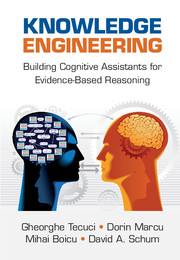Book contents
- Frontmatter
- Contents
- Preface
- Acknowledgments
- About the Authors
- 1 Introduction
- 2 Evidence-based Reasoning: Connecting the Dots
- 3 Methodologies and Tools for Agent Design and Development
- 4 Modeling the Problem-Solving Process
- 5 Ontologies
- 6 Ontology Design and Development
- 7 Reasoning with Ontologies and Rules
- 8 Learning for Knowledge-based Agents
- 9 Rule Learning
- 10 Rule Refinement
- 11 Abstraction of Reasoning
- 12 Disciple Agents
- 13 Design Principles for Cognitive Assistants
- References
- Appendixes
- Index
Preface
Published online by Cambridge University Press: 05 September 2016
- Frontmatter
- Contents
- Preface
- Acknowledgments
- About the Authors
- 1 Introduction
- 2 Evidence-based Reasoning: Connecting the Dots
- 3 Methodologies and Tools for Agent Design and Development
- 4 Modeling the Problem-Solving Process
- 5 Ontologies
- 6 Ontology Design and Development
- 7 Reasoning with Ontologies and Rules
- 8 Learning for Knowledge-based Agents
- 9 Rule Learning
- 10 Rule Refinement
- 11 Abstraction of Reasoning
- 12 Disciple Agents
- 13 Design Principles for Cognitive Assistants
- References
- Appendixes
- Index
Summary
BOOK PURPOSE
This is a book on knowledge engineering, the discipline concerned with the development of intelligent agents that use knowledge and reasoning to perform problem-solving and decision-making tasks. The book covers the theory and practice of the main stages in the development of a knowledge-based agent: understanding the application domain, modeling problem solving in that domain, developing the ontology, learning the reasoning rules, and testing the agent. However, it does this by focusing on a special class of agents: cognitive assistants that learn complex problem-solving expertise directly from human experts, support experts, and nonexperts in problem solving and decision making and teach their problem-solving expertise to students. These are learning agents that are taught by their users in ways that are similar to how a student, an apprentice, or a new collaborator is taught, through problem-solving examples and explanations and by supervising and correcting their behavior. Because such agents learn to replicate the problem-solving behavior of their users, we have called them Disciple agents.
This book presents a significant advancement in the theory and practice of knowledge engineering, where many tasks are performed by a typical computer user and a learning agent, with only limited support from a knowledge engineer. To simplify further the development of the cognitive assistants by typical users, we have focused on the development of cognitive assistants for evidence-based reasoning. Evidence-based reasoning is at the core of many problem-solving and decision-making tasks in a wide variety of domains, including intelligence analysis, cybersecurity, law, forensics, medicine, physics, chemistry, history, archaeology, education, and many others. Nevertheless, the last part of the book presents Disciple agents for applications that did not involve evidence-based reasoning.
Because knowledge engineering is a practical activity, it is best learned by doing. Therefore, this book presents the theory and methodology of developing cognitive assistants in conjunction with a practical tool, Disciple-EBR, a learning agent shell for evidence-based reasoning (EBR). Consequently, each chapter typically contains a theoretical part presenting general concepts and methods, a methodological part with guidelines on the application of the methods, and a practical part on the actual employment of these methods with Disciple-EBR. It also includes project assignments and review questions.
- Type
- Chapter
- Information
- Knowledge EngineeringBuilding Cognitive Assistants for Evidence-based Reasoning, pp. xv - xxPublisher: Cambridge University PressPrint publication year: 2016

